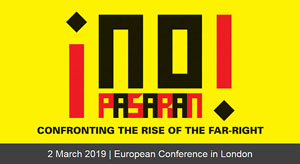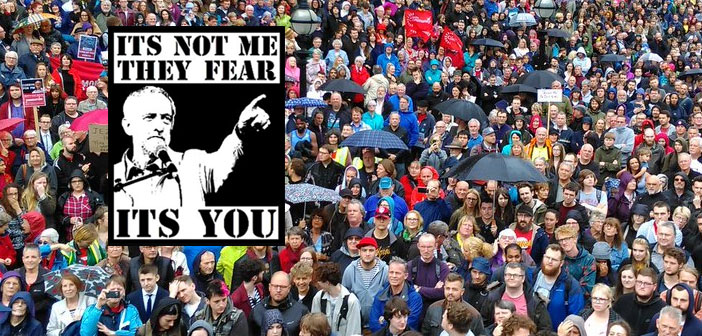Source: Counterfire
There is no need to apologise for things that we are not guilty of and the left in its overwhelming majority is not guilty of antisemitism.
I have thought long and hard about commenting at length on the antisemitism crisis – partly because its latest manifestations have coincided with my being away, but more importantly because it is now such an extraordinarily sensitive issue that it is difficult for those of us who aren’t Jews to address. There have also been a number of very good responses to the question from Jewish and non-Jewish friends and comrades alike.I think for all of us on the left this is a very upsetting question, since we all regard anti-racism as central to our politics, but also because we recognise the enormity of where antisemitism can lead. So our understanding of antisemitism has to be put in the context of the unique crime that was the Holocaust and the very many other forms of repression and discrimination which Jews have suffered for centuries. We also recognise the important role that Jewish people have played in leftwing and socialist movements. In my political lifetime they have played a disproportionately central role in terms of their numbers in the civil rights movement in the US, the anti-apartheid movement, the women’s liberation movement and much more. The idea that antisemitism plays a major role on the left should be anathema to us all.
But it’s partly for this reason that it is impossible not to address it now. The argument is affecting the whole future of left politics in Britain and the criticisms of Jeremy Corbyn are presenting a challenge to his whole leadership. Indeed the row over antisemitism is very much framed as about Jeremy Corbyn’s leadership. If that challenge is successful it will mark a major setback for all of those of us who want fundamental left transformation in Britain.
It is also important because any form of racism – including antisemitism – is not just an issue for those directly affected by it. It affects and distorts the whole of society and one of the aims of racism is to weaken any united fightback against rightwing and fascist policies. We know that the strengthening of the far right weakens all of us on the left and we know racism is at the centre of far right politics. That’s another reason why combatting it has to be at the centre of our politics on the left.
However, the issue to do with the row over Labour antisemitism is about much more than how you combat a certain form of racism. It is in part about whether criticism of Israel as a political state can spill over into antisemitism and whether support for the Palestinian cause can be seen as anti-Jewish. And it is now a question of who leads Labour. There is no doubt that many of those now spearheading the campaign – from Jewish Chronicle editor Stephen Pollard to rightwing Labour MPs like Margaret Hodge and Ian Austin – have a political aim of replacing Corbyn as leader with someone much less radical on other issues as well as Palestine.
We should not forget either that the Israeli embassy was implicated in interfering in British politics last year when one of its diplomats was recorded as saying that he wanted to ‘bring down’ a pro-Palestine Tory MP, Alan Duncan. While he was sent back to Israel in disgrace, the matter went no further – disgracefully given that this was blatant interference in the British political system. Are we seriously supposed to imagine that this was a maverick operation, or that there is no other attempt to influence British politics, especially when both Labour and Conservative Friends of Israel organisations have strong links with the embassy? The present ambassador is Mark Regev, the man who was press spokesman in 2009 when he defended the killing of Palestinians through Operation Cast Lead, and who has defended the recent killings of Gazan Palestinians by Israeli forces.
The present argument on antisemitism resurfaced over the definition of antisemitism agreed by the International Holocaust Remembrance Alliance (IHRA) – a definition widely accepted at its core, but where there are greater political differences over the political clauses and examples that accompany it. The decision by Labour’s NEC, in my view completely correctly, was to accept some of those examples but not others, especially those which imply that criticism of Israel is antisemitic. This caused a major backlash in the PLP, a body often overtly hostile to Corbyn.
The accusation now is – in the appalling words of Margaret Hodge – that Jeremy Corbyn is “a fucking racist and an antisemite” and that Labour is riddled with antisemitism which Corbyn tolerates or even supports.
Both accusations are slanderous, but are repeated and encouraged throughout the media and the political establishment. There are a number of cases of antisemitism which have been found, but overall a small number in a party the size of Labour. They should be dealt with by due process and appropriate action taken. It seems to me the remarks by Peter Willsman at the NEC or indeed those by Marc Wadsworth who was expelled earlier this year are not antisemitic, whether you agree with them or not. Many Labour activists say that they have experienced little or no antisemitism directly. That doesn’t mean it is not there, but it hardly seems of epidemic proportions if this is the case. It is after all a matter of record that Labour’s previous leader, Ed Miliband, was Jewish, and to the best of my recollection he suffered several major antisemitic attacks. These were however all from the right, who complained about his inability to eat a bacon sandwich, his north London geekiness and his Jewish refugee father’s supposed lack of patriotism.
Jeremy Corbyn defended him in all those cases. That doesn’t surprise me at all, not just because of his own committed anti-racism but also because antisemitism today (and historically) has come from the right. This is still alarmingly the case in Hungary, Poland and Austria – none of whose discriminatory political pronouncements raise a fraction of the ire that Corbyn does among his enemies.
In terms of dealing with this argument, there is a crucial distinction to be made about antisemitism – and that it is not the same as criticism of Israel. Indeed, such criticism is essential if we are to distinguish between the mass of Jewish people and a state whose actions are increasingly discriminatory towards Palestinians.
The new national law further enshrines such discrimination, allowing small towns and villages to exclude Palestinians, for example. It legalises a form of apartheid within the state which has always been there. Every Jew anywhere in the world has the right to live in Israel, yet Palestinians whose families were driven from their land in 1948 have no Right of Return. Millions of Palestinians live as refugees or in occupied territories. The Netanyahu government – egged on by Donald Trump – is increasing illegal settlements and is trying to move the capital to Jerusalem in contravention of international law. When the Palestinians defend themselves they are bombed and shot at, and denounced as terrorists.
It isn’t antisemitic to say this. Nor is it antisemitic to say, as I believe, that there should be one democratic secular state where all religions and nationalities live together – as Jews, Muslims and Christians have done in the Middle East for hundreds of years.
It would also help if we had a bit more of a historical perspective, and recognised that the Jewish movement has always been politically divided – from the whole question of Zionism and a Jewish state to issues such as whether to physically oppose the fascists at Cable Street. This is also true of the socialist and left movement more widely. I am opposed to those who make comparisons between Israel’s treatment of the Palestinians and the Nazis’ persecution of Jews. They are at the very least insensitive to Jewish people, who nearly all lost family in the Holocaust. They are also usually historically inappropriate. At the same time, that should not mean that we forget our history.
The socialist movement had a long tradition of opposing fascism. This is why when Hitler came to power many of his first victims were the socialists and communists who were such staunch opponents of fascism in the years before 1933. The aim was to destroy the organised working class movement precisely to make it easier to then persecute and later exterminate so many Jews – as well as Roma, lesbians and gays, the disabled and other sections of society.
This history should be the subject of debate and discussion – not weaponised as a means of attacking a leader with a record second to none on fighting racism.
There’s only one way to stop a witch-hunt – stand up to it
The witch-hunt around this question has been astonishing, with Jeremy Corbyn being accused of being an “existential threat” to Jewish people in Britain, and increasingly vociferous demands for apologies, retractions and the like. This witch-hunt is increasingly aimed at the Labour leadership and its aim will be to reverse advances for the left in Labour. The media is grotesquely magnifying the witch-hunt with every right wing paper that routinely denounces ‘political correctness gone mad’ or delights in scapegoating Muslims and refugees now denouncing ‘shameful’ racism from Labour.
This is a politically motivated witch-hunt aiming to undermine the Corbyn leadership, and can only be fought politically. Ian Austin is so far to the right of Labour that he heckled Jeremy when he apologised for the Iraq war. Last week he denounced Stop the War as Saddam supporters – another lie. There will be no satisfying him and his allies. The Jewish Museum was pressurised to stop Jeremy Corbyn making a speech on this subject in its premises. He is constantly being accused of guilt by association, most recently when he shared a platform with a Holocaust survivor (a point rarely remarked on) who compared Israel and the Nazis.
This has all led to a culture of finger pointing, apology demands and denunciation. The problem is you cannot defeat a witch-hunt by agreeing with it. There will always be something dragged up from past as a new crime to denounce, there will always be people who say stupid or ill-advised things that can be picked up on. There is no need to apologise for things that we are not guilty of – and the left in its overwhelming majority is not guilty of antisemitism. In fact, it has a proven track record of fighting antisemitism.
So the only way to deal with this is to reaffirm our politics on Palestine in a serious and intelligent way, to offer to debate and discuss how we resolve these questions, but not to give any ground on the political principles. We should also not start denouncing our own side, as this ends up being counterproductive. There are too many on the left who approach this by blaming others on the Labour left rather than seeing it as a major onslaught from forces on the right. We shouldn’t concede that there is a major problem on the left with this – because there really isn’t and to keep saying so only weakens the real fight against antisemitism. And that weakens us all.
Lindsey German is the national convenor of Stop the War Coalition.
¡No pasaran! Confronting the Rise of the Far-Right
 2 March 2019 ¡NO PASARAN! Conference in London to organise against Europe-wide rise of the far-right. Bringing together activists, MPs, campaigners from across Europe.
2 March 2019 ¡NO PASARAN! Conference in London to organise against Europe-wide rise of the far-right. Bringing together activists, MPs, campaigners from across Europe.

